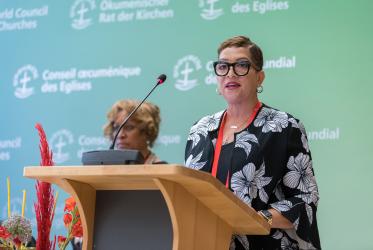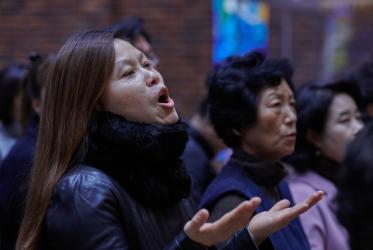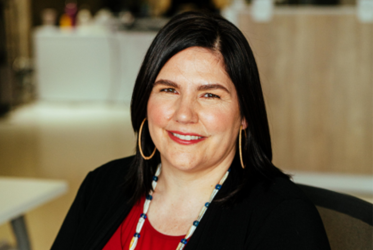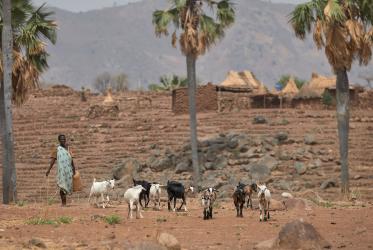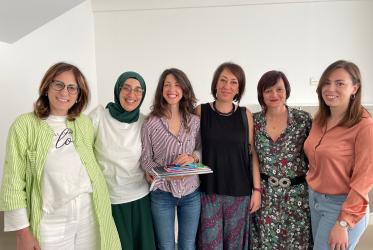A World Council of Churches Pilgrim Team Visit held on 23, 26-28 May was dedicated to reflection and the search for solidarity actions in the face racism and gender injustice against indigenous people in Canada. One dialogue of the online visit focused on the theme "Missing and Murdered Indigenous Women and Girls,” with a special contribution by Canadian First Nations politician Bernadette Smith. She was elected to the Legislative Assembly of the Province of Manitoba in a by-election in 2017, motivated by the process her family went through after the disappearance of her sister Claudette, at the age of 21, in 2008.
Participants heard Bernadette's touching narrative, about her family and many others who suffer because of the violent disappearance of their loved ones. The group also heard about the initiatives of these families and activists in carrying out actions in search of justice for the victims (even playing the role of the police and the judiciary), easing the suffering, and preventing future violence.
The pilgrimage team learned, through an informative video and reflections from Canadian participants of the visit session, that the official homicide rate of women belonging to indigenous groups is almost six times higher than that of the rest of Canadians. About 10% of all women declared missing are indigenous.
The issue of residential indigenous schools, which operated between 1883 and 1996 (until quite recently), was highlighted. About 150,000 indigenous children were forcibly removed from their families and sent to this state-funded boarding system administered by the churches for more than half century. According to some estimates, some 6,000 children died and many more suffered physical and sexual abuse.
Other government programs have sterilized indigenous women and placed more than 16,000 indigenous children for adoption by non-indigenous families. "The objective was not only to kill indigenous culture but to eliminate indigenous people. Extinguish them," described Archbishop Mark MacDonald from the Anglican Church of Canada.
National Truth Commission findings
A National Truth Commission had already reported in 2015 on the physical, psychological, and sexual abuse that the indigenous population suffered in the country with this State project. The Canadian Indian Act, of 1876, which gave the Canadian government the power to dictate who was considered an “indigenous," moved people to areas with few resources and isolated reserves and controlled their finances. It remains the core of many policies and regulations in place today.
Evaluations point out that the experience at boarding schools was a factor that spread violence and problems of chemical dependency among the survivors. Likewise, the National Truth Commission report evokes the forced sterilizations suffered by several indigenous women, a practice that officially ended in 1973, but investigations and several testimonies pointed to later cases. In addition, the commission noted that the suicide rate is five to seven times higher among indigenous youth.
The commission made hundreds of recommendations, including changes to police protocols, with more indigenous agents, and the judicial system. The report states that the justice apparatus has always ignored the problems of indigenous women and viewed them through "lenses of persistent racism and sexist stereotypes.” This generated a lot of mistrust between them in relation to the system. "Police apathy often takes the form of stereotyping victims and criminalizing them, such as when the police describe the missing as ‘drunk,' 'partying' or 'prostitutes not worth looking for,’ according to the report.
Prime Minister Justin Trudeau has promised a "total renewal" of Canada's relationship with its indigenous peoples and a commitment to include more indigenous rights in Canadian law. The Trudeau government established a Commission of Inquiry on missing and murdered indigenous women. However, many families and activists expressed their opposition to this action (including Bernadette Smith’s), as they believe that an action plan with the recommendations already made by the National Truth Commission would be more effective.
The pilgrim team also learned about role of the Native Women's Association, the non-governmental organization Drag The River (which seeks to rescue missing bodies in the Red River to return them to families) and other organizations working to defend this cause.
The visit ended with important reflections that highlight the intersectionality of the issue of missing and murdered indigenous women: gender, racism and colonization. Bernadette Smith's quote, "Out of sorrow comes action,” echoed throughout the session as an inspiration and joined the prayer sung by Archbishop MacDonald in the prayer moment, "Send Your Spirit to make my heart strong.”

